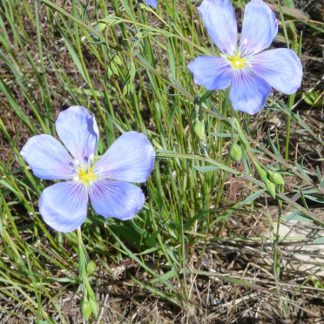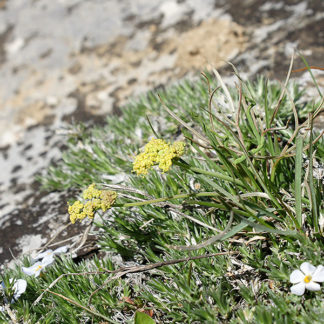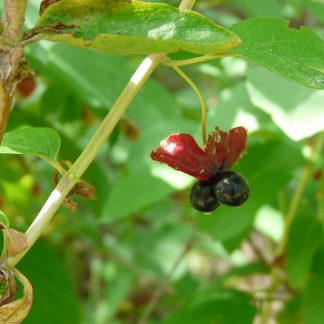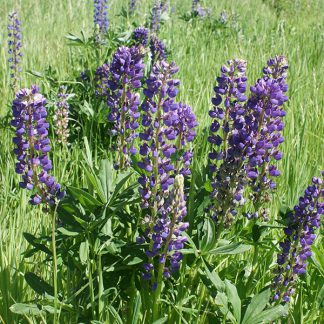native
Showing 145–156 of 282 results
-

Koeleria macrantha / Prairie Junegrass
- short, tuft-forming bunchgrass
- leaves short and basal with raised veins
- grows in early spring; flowers in June/July
- spike-like cylindrical inflorescence, 2-5" long, tan or purple
- scattered distributions, esp. in rocky or sandy forests or plains
-

Lactuca pulchella / blue lettuce
- looks like prickly lettuce, but blue and without prickly stems or leaves
- clonal from spreading roots
-

Ligusticum filicinum / fern-leaf licorice root
- found at higher altitudes in moister, forest areas
- compound umbel with white flowers in comparatively widely spaced umbellets
- large, very finely divided leaves; leaflets long and thin - "fern-like"
-

Linum lewisii / wild blue flax
- intense blue, 5-petaled flowers
- red-ish or darker blue veins in petals
- buds, flowers and developing fruit present at same time
- narrow, sessile, 1 inch (ish) leaves
- especially on roadsides and in meadows in the Valley
-

Lithophragma parviflorum / smallflower woodland star
- small, white (or mauve) flowers with 5 highly disected petals
- up to 14 flowers per stalk, usually much less
- deeply lobed, glandularly pubescent leaves at stem bases
- spring bloomer in a wide variety of habitats
-

Lithospermum ruderale / Columbia puccoon
- small, pale yellow flowers in early spring
- flowers in dense clusters, nestled among the leaves
- 1–3 in. long, linear leaves, notably crowded on upper part of stems
- in dry areas, especially with sagebrush
-

Lomatium dissectum / fernleaf biscuitroot
- blooms soon after snowmelt
- yellow or purple-ish flowers in compound umbels
- highly divided, fern-like leaves
- rocks, rocky soils, sagebrush communities
-

Lomatium triternatum / nineleaf biscuitroot
- flowers soon after snowmelt
- yellow compound umbel on leafless stem
- leaves are three-fold compound; leaflets grass-like
- may be tall with wide umbels on good soil
- may be very short with small umbels on rocky, sandy, low nutrient soil
-

Lonicera involucrata / twinberry honeysuckle
- flowers - inconspicuous, paired, yellow, bell-shaped with green bracts
- leaves - opposite, oval, often hairy beneath
- fruit - a pair of blue-black/purple berries with red, winglike bracts
- multi-stemmed shrub - to 15 feet tall
-

Lonicera utahensis / Utah honeysuckle
- flowers - white or cream, in pairs, bell-shaped, nodding
- fruit - bright red berries in pairs, fused at the base
- no noticeable bracts on either flowers or berries
- short-ish shrub, multi-stemmed
- understory, especially in moist forests
-

Lupinus spp. / silvery and silky lupins
- palmately compound, usually silvery-green leaves
- 5-9 leaflets per leaf; long petioles
- flowers on long, spikey racemes, blooming from bottom upward
- numerous flowers, but all rather teeny; most purple or blue
- flowers are above the leaves
- seeds in short, hairy pods
-

Madia glomerata / mountain tarweed
- stems, leaves, flowers - strongly aromatic, like tar
- sticky glandular hairs cover foliage and floral bracts
- flowers in clusters with 1 to 3 yellow ray florets
- disk florets retain visible petals; black stamens
Showing 145–156 of 282 results